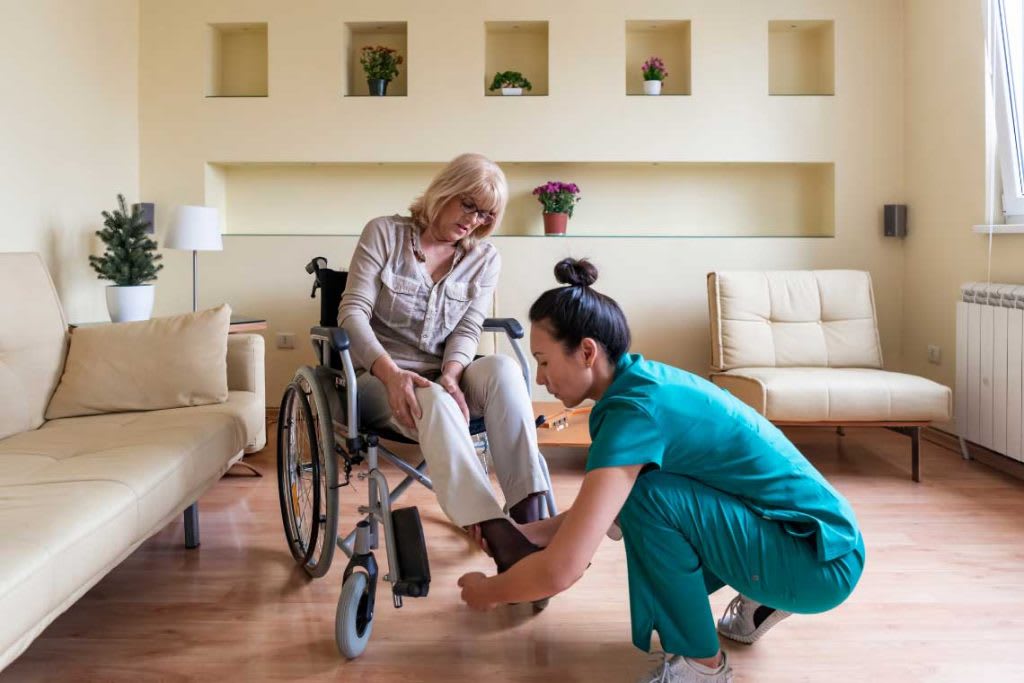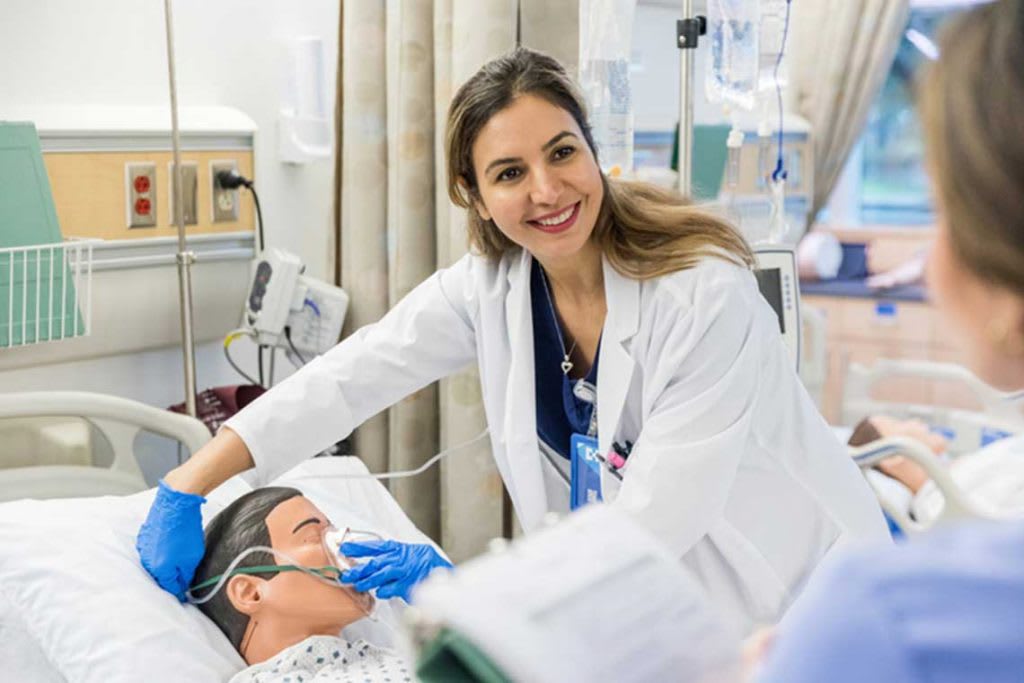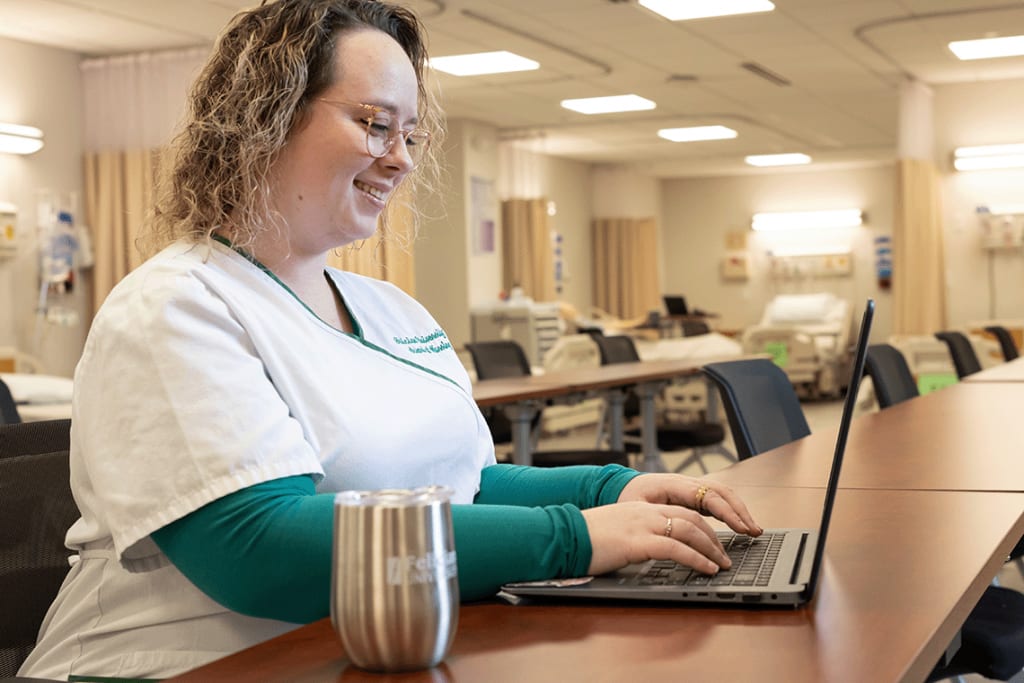10 Alternative Nursing Careers to Consider
Each blog post is dated and contains accurate information as of that date. Certain information may have changed since the blog post publication date. If you would like to confirm the current accuracy of blog information, please visit our ABSN overview page or contact admissions at (844) 347-2497.
Although many nurses work at the bedside in hospitals, there are plenty of alternative nursing careers to consider. Some of these include roles providing patient care, such as camp nurse or telehealth nurse. Other careers in nursing include public health nurse, medical journalist, nurse researcher and nurse educator.

The U.S. is experiencing a severe nursing shortage, and job growth is expected to hold steady for the foreseeable future. If you’re dissatisfied with your current job and searching for a meaningful career, you might want to consider becoming a registered nurse (RN).
When you enter nursing with a Bachelor of Science in Nursing (BSN), you can practice in myriad inpatient and outpatient settings. While you may find your perfect fit in a traditional hospital role, you may also find alternative nursing careers that interest you. With a BSN from Felician University, you have options.
If you have a non-nursing bachelor’s degree or college credits, our hybrid or on-ground Accelerated Bachelor of Science in Nursing (ABSN) programs could help you earn your nursing degree in as few as 16 or 18 months.

What is an accelerated nursing program? Read all about it here!
Alternative Nursing Careers Providing Direct Patient Care
Direct patient care refers to assessing, monitoring and treating patients. Although many direct patient care careers in nursing are in hospitals and clinics, you can also find alternative careers for nurses that involve working with patients one-on-one. Here’s a look at four top choices.
1. Home Health Nurse
Not all patients can travel to a hospital every time they need to see a provider. Home health nurses work with patients in the comfort of their own homes so they can receive the care they need regardless of transportation difficulties or mobility restrictions.
These alternative careers for nurses often focus on working with patients who are elderly, suffering from chronic conditions or recovering from surgery. Some home health nurses work for hospice agencies, specializing in working with patients at the end of life.
2. Telemedicine Nurse
Telemedicine nursing, also called telehealth nursing, has been available for quite a long time. However, since the COVID-19 pandemic, its usage has increased. This presents more job possibilities for nurses interested in working with patients in a different physical location from the nurse.
Telemedicine nursing uses technology such as video chats to treat patients no matter where they are. Telemedicine can significantly impact people who live in rural areas, have chronic conditions, are experiencing transportation challenges or are physically unable to visit a medical professional in person.
Telehealth has recently been a great resource for rural schools that may need help staffing a school nurse in person.

Want to learn more about pursuing a career in telehealth nursing? Check out this blog.
3. Camp Nurse
Who doesn’t miss going to summer camp? As a camp nurse, you won’t have to. If you’re passionate about working with kids, this may be your perfect role. Many school nurses work as camp nurses in the summer when school is out.
Camp nurses are generally always on call at the camps they work for and may be expected to stay on campus at all times if working an overnight camp. They provide first aid and treat campers and staffers.
4. Health Coach
A career as a health and nutrition coach can be an excellent option for someone with a BSN who wants to start their own business or work with an established company. These alternative nursing careers are also ideal for those with great interpersonal skills who want to help others live their healthiest life.

Health coaches help individuals reach their personal health goals, but they can also lead classes or workshops. Health coaches identify their client’s goals and use their nursing background to map out an achievable plan so clients can become as healthy as possible in a realistic timeframe. They can work in gyms, for corporations or out of their own offices.
Careers in Nursing That Don’t Involve Providing Direct Patient Care
While many alternative careers for nurses enable RNs to work one-on-one with patients, these aren’t the only options. Several careers in nursing don’t involve providing direct patient care at all. Check out these six alternative nursing careers.
5. Nurse Educator
If you like the thought of working in academia, becoming a nurse educator may be a solid option. Nurse educators work to educate and train the next generation of aspiring RNs and nurse leaders. They develop curriculum and lesson plans, teach classes, field questions and grade assignments.
To become a nurse educator, you’ll first need to earn your BSN and license and then gain clinical experience at the bedside. Then, you’ll need to earn a graduate nursing degree.
6. Nurse Researcher
If you’d rather compile data and delve into research for laboratories, universities or a business than make rounds at a hospital, a career as a nurse researcher might be perfect for you. As a nurse researcher, you’d study diseases, treatments, and preventive measures and analyze, record, and present data. Your work can contribute to the body of knowledge in the field and allow other nurses to apply evidence-based nursing skills to their patient cases.

7. Forensic Nurse
If you are a “CSI” or “Law and Order” fan, you may understand how vital a forensic nurse’s skills can be. A forensic nurse’s work can help put criminals behind bars and assist crime victims toward recovery. Although these alternative nursing careers typically involve providing some direct patient care, they also step out of the bedside role for many other tasks related to criminal investigations and prosecutions.
Forensic nurses generally provide compassionate care to victims of violent crimes, conducting a forensic examination to collect physical evidence. These nurses may also consult with law enforcement professionals, lending their expertise on medical issues.
A forensic nurse has a multifaceted skillset that includes public speaking (forensic nurses often testify in court), the ability to provide trauma care, and meticulous attention to detail. These nurses can work in hospitals, criminal justice facilities and other settings.
8. Medical Journalist
Have you ever wanted to see your name in print? As a medical journalist, you could write for publications and journals. Nurses who become medical journalists use their knowledge to write informed articles about the medical field, weigh in on current healthcare issues or write columns giving advice or perspective from a nursing standpoint.
Medical journalists may work for universities or on staff at medical journals, but freelance or contributor roles are also well within reach. They may also publish their work in consumer-facing publications.
9. Nurse Lobbyist
If you’re interested in putting your nursing skills to work in lawmaking, a career as a nurse lobbyist will surely keep you on your toes. Nurse lobbyists usually work for healthcare organizations, such as professional associations.
Their goal is to persuade lawmakers regarding legislative matters that affect healthcare and to give input on legislation. These nurses work to improve laws regarding patient safety, patient rights and other issues at play relating to healthcare. They also analyze the latest data and research to inform lawmaking bodies better.
10. Public Health Nurse

Public health nurses sometimes provide direct patient care, but their role is often behind the scenes. These professionals work tirelessly to address community healthcare needs. This can include working for organizations, nonprofits, and federal, state or local health agencies.
These nurses also help treat at-risk individuals and implement preventive care programs. RNs have the expertise to become public health nurses; however, a Master of Science in Nursing (MSN) is usually necessary to do this job well and grow within the role.
Of course, the first step to any of these alternative nursing careers is to complete a reputable undergraduate nursing program, like the Accelerated Bachelor of Science in Nursing (ABSN) program at Felician University.
How to Accelerate Your Nursing Career
If you have a conferred non-nursing bachelor’s degree or a minimum of 60 credits with a cumulative 3.0 GPA for all undergraduate coursework, you may qualify for our ABSN program in New Jersey.
It’s always best to speak with one of our admissions counselors to review your eligibility and the admissions requirements. Your admissions counselor will ensure you’re a good fit for our ABSN program and vice versa. They can also explain what it takes to be successful in the program.
When you apply to the School of Nursing at Felician University, you can choose to accelerate your nursing education by way of our Hybrid ABSN program or On-Ground ABSN program.

No matter the program option you choose, you can expect to:
- Receive an accredited nursing education from a respected university with award-winning and nationally recognized programs.
- Learn how to provide competent, compassionate care to diverse patient populations.
- Develop your nursing skills and clinical judgment in a state-of-the-art learning facility.
- Gain real-world clinical experience in diverse areas of patient care.
- Graduate prepared to sit for the NCLEX-RN® exam with confidence.
- Enter the workforce as a practice-ready nurse.
Ready to Get Started on Your BSN?
No matter where your nursing career takes you, you can build a strong foundation for future success at Felician University. We offer two ABSN program options so you can choose the one that best fits your needs and learning preferences. Plus, your dedicated admissions counselor will walk you through the process of applying step by step and answer all your questions about becoming a nursing student.
Contact us today to learn more about the Felician ABSN admissions process.
